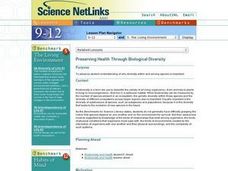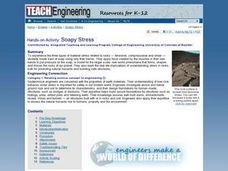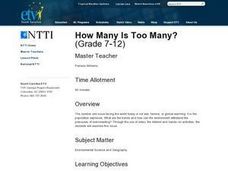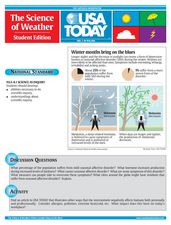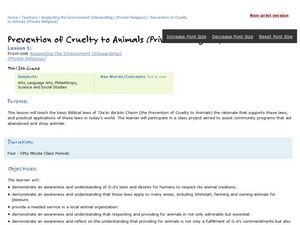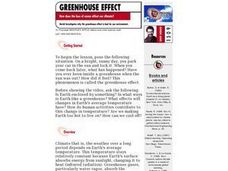Curated OER
Carnival of Carnivores
Students research different species of meat-eating animals in their natural environments to create a Carnival of Carnivores exhibit for their classroom.
Curated OER
Preserving Health Through Biological Diversity
Young scholars research and explore the benefits of biodiversity, particularly as it relates to human health. They write an essay in which they explain the possible effect of human activities on the emergence of new diseases.
Curated OER
Education: Passing Enough Knowledge to Survive to the Next Generation
Students compare and contrast the knowledge requirements for human and animal children. They identify the consequences of an animal if it is unprepared for the given environment. They discover the importance of education as well.
Curated OER
Comparison of hometown life with that of life in a Canadian city
Students research cultural characteristics of a Canadian city with that of their home town. They complete a map handout, providing the relative location on a large map and the absolute location on a provincial map. Students work together...
Curated OER
Soapy Stress
Students investigate the three types of material stress related to rocks. They identify the three types of stress, conduct a simulation by breaking bars of soap using only their hands, and complete a worksheet.
Curated OER
How Many Is Too Many?
Students explore the population explosion. They view a video depicting the exponential growth of human population. Students research the internet to project future population data. They perform hands-on, multimedia activities to study...
Curated OER
Turtle Lesson
Learners explore the five common turtles that are native to the eastern United States. They investigate each turtle's characteristics, environment, means of protection, eating habits, and show how they can help these turtles survive.
Curated OER
The Science of Weather
Students read an article. In this seasons instructional activity, students discuss the seasons and seasonal affective disorder. Students find an article that illustrates other ways that the environment negatively effects humans.
Curated OER
Environmental Law-Making
Students go through the process of creating and passing a federal law. They select an environmental issue, research related policies for the issue, draft the bill, discuss it among committee members, bring it before the class and bring...
Curated OER
Salmon Scavenger Hunt
Students go on a salmon scavenger hunt to find out about threats to salmon populations. They gather information about some of the reasons wild salmon have gone from such incredible abundance to relative scarcity, and about some of the...
Curated OER
City Animals
Young scholars identify some of the most important native and introduced species of animals in the United States. They describe how animals populations of cities have changed over time, outline the benefits and problems associated with...
Curated OER
Prevention of Cruelty to Animals (Private-Religious)
Students examine how to prevent cruelty to animals. In this stewardship lesson, students discover the Biblical laws of Tza’ar Ba’alei Chaim. Students volunteer their time to assist community organizations that promote animal welfare.
Curated OER
Flora and Fauna of the Hill Neighborhood
Students compare and contrast the characteristics of plants and animals. In this ecology activity, students observe the outdoors and describe the relationship among different living things. They relate plant diversity with animal diversity.
Curated OER
Cancer Causes
Learners explore why people get cancer. They explore human cells by taking a close examine their own. take a small sample of the epithelial cells that line the inside of their mouth. They glimpse how scientists investigate inside cells.
Curated OER
In Search of a Land Ethic
Students research the theory that everything is connected to everything else. Students explore the concept of how do we put normative values on our nonhuman environment. Students investigate an ecologist and write an informational...
Curated OER
Heat Pollution and Communities
Learners examine thermal pollution by collecting temperature data on the school's photovoltaic panel. Students collect data for four consecutive days and retrieve information from other classes that meet at different times of the day. ...
Curated OER
Changes in Ecosystems
In this changes in ecosystems activity, students complete 21 various types of questions related to ecosystem. First, they determine whether each statement is true or false based on vocabulary. Then, students determine whether natural...
Curated OER
Anti-Dogfighting Curriculum: Media and Propaganda Extension Lesson
Young scholars investigate the different types of propaganda. In this media analysis lesson, students define and investigate the various types of media propaganda. Young scholars observe how advertisements may not show how the item...
Curated OER
Insects Are Helpful!
Students see that insects do lots good and are very valuable to humans and nature. This is part of an ongoing effort to dispel fears of insects. They rotate through a series of centers that have examples of how insects contribute to our...
Curated OER
How Does the Loss of Ozone Affect Our Climate
Students explore the greenhouse effect and what it does to the environment. They discuss if and how human behavior contributes to global warming and test natural materials for carbon content.
Michigan Sea Grant
Food Chains and Webs
Starting with a simple food chain, young scientists interpret the difference and interrelatedness between herbivores, carnivores and producers. They answer questions related to cause and effect of food chain disruptions, including the...
Curated OER
World Trade-Offs
Students assess how global trade impacts the businesses and industries of their city. They explore world trade and interview people at related business and industries.
Curated OER
LAND USE ISSUES
Learners relate math with real life situations. They identify and plot points on a grid map. They identify and locate the Drop Box Sites.
Curated OER
Nutrition: It's In Your Hands
Fourth graders use this lesson to focus on their health, nutrition and the state of the environment. In groups, they examine the various types of land, water and air pollutants and compare and contrast a food chain with and without a...



